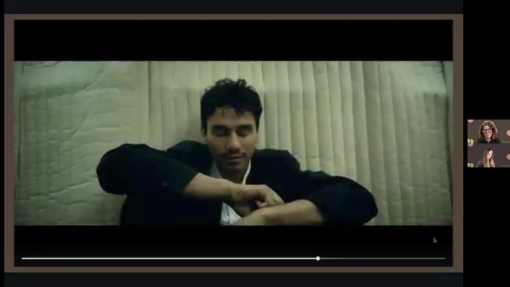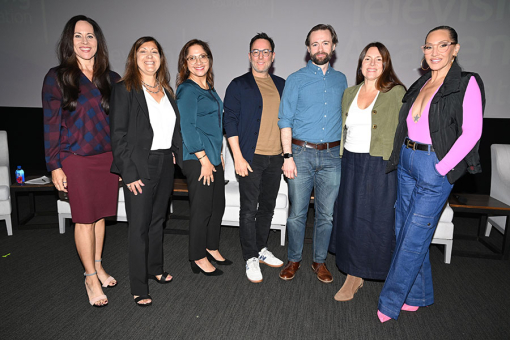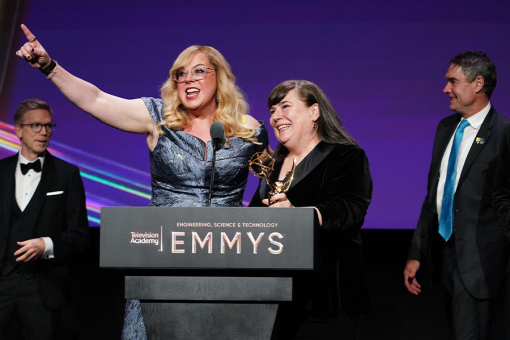Mental health is just as crucial as physical health, but according to surveys and personal anecdotes, the entertainment industry can foster a sometimes-unpleasant atmosphere for mental wellness, and individuals working in entertainment are approximately three times more likely to struggle with a mental health challenge than non-industry professionals. Perhaps that's not surprising, especially given the circumstances that have affected the industry and increased unemployment rates — including the Covid-19 pandemic, the WGA and SAG-AFTRA strikes, economic contraction and the rise of AI.
To help its members navigate concerns created by these developments, and deal with other aspects of mental health, the Television Academy presented two virtual events in November, with replays available online and the promise of more events to come in 2025.
On November 18, "Imposter Syndrome and the Inner Critic: Creativity Compromised" spotlighted imposter syndrome, a condition marked by self-doubt and the fear of being discovered as a fraud. On November 20, "Minding Your Mental Health" featured experts who offered insights into emotional resilience and coping with financial and career vicissitudes, along with resources for further information and help.
Founders Ozlem Tuskan and Susan Walbrook of OS Collectives, which presented the "Imposter Syndrome" webinar, are so enthusiastic about their mission that they stayed up well past 2:00 a.m. in England, where they are based, to accommodate Academy members' U.S. time zones. OS Collectives is a consultancy and movement that helps creative entrepreneurs and leaders overcome imposter syndrome, based on research gleaned from in-depth interviews with 65 creative professionals in numerous fields, including television, and data from more than 40 reports.
About 80% of people experience imposter syndrome, which can cause crippling anxiety, panic attacks, guilt, isolation, fatigue, a sense of utter failure even with objective proof of success and ultimately, burnout. In entertainment, those effects are amplified by the rise of AI, against which people feel an increasing need to prove their worth to find, or keep, a job. Most sufferers believe that imposter syndrome is simply a way of life: If you can't fix it, you must learn to live with it. But if most people feel like they're "faking it," innovation can be stifled.
Walbrook described the imposter syndrome thought process: "At times, I feel my success is due to some kind of luck. I'm afraid that others will discover how much knowledge or ability I really lack. I'm afraid that I may fail at a new project. I receive a great deal of praise, but I tend to discount it. I feel really icky at receiving a compliment about my work." There's a steady stream of negative self-talk, which creates a state of insecurity and a feeling of worthlessness.
Though men and women experience imposter syndrome about equally, 70% of women reported turning down opportunities due to the affliction, versus 50% of men. Some women also said they didn't start experiencing imposter syndrome in the workplace until they became mothers. People raised in higher socioeconomic circumstances generally have more confidence and therefore fewer feelings of inadequacy. While many factors play into the existence of imposter syndrome, being surrounded by an encouraging, supportive community can help quell the negativity.
The entertainment industry must actively support creatives in building confidence, reminding them that vulnerability and creativity go hand in hand.
Ways to do so include:
• Training programs for senior leaders, to help them understand the importance of vulnerability and model it for their teams, to help them understand their own imposter syndrome and self-doubt and to give them a toolkit so they can be confident leaders.
• Storytelling sessions, to encourage leaders to share their personal challenges and growth experiences, reinforcing the value of openness so that others can feel they're not alone with their imposter feelings and creating a safe space for open conversation to express themselves without shame or guilt.
• Feedback loops, regular sessions where leaders can give and receive input, fostering a more collaborative culture and more human connection.
Webinar viewers can download a free report on the founders' findings here.
"Minding Your Mental Health" brought together four compassionate experts in their respective fields: moderator Cathy Applefeld Olson, founder of Hollywood & Mind, a bridge for the entertainment industry and mental health communities; Dr. Leslie Carr, a clinical psychologist and authority on how trauma, stress, culture and digital technology affect the mind; Miata Edoga, CEO and founder of financial education company Abundance Bound; and Angela Silak Vargas, co-founder of Hollywood Résumés, a résumé writing and career services business for entertainment professionals.
Carr started with an immediate action step: encouraging attendees to "get present" during the webinar and to stay present with the sensations in their body as they listened to the speakers and let the worries of life fall away while doing so; the practice, known as "present moment awareness" or "mindfulness," can help regulate the nervous system to achieve a state of inner calm, helping people better cope with anxiety and other negative feelings.
Edoga asked participants to release the shame and guilt they may be feeling about their finances, noting that in the entertainment business there is always a level of stress and uncertainty about finances because of the unknowns in the business, now heightened by the pandemic, strikes and other previously noted factors. "It is a very, very particular time," she said. People's recognition that they are not doing anything wrong can be grounding and a step toward moving forward financially.
For the same reasons, Vargas added, there is also no shame and guilt about not having a job right now, if that is the case. From a career coaching perspective, people should set micro goals for themselves — rather than having everything hinge on finding a job — which can generate momentum; such goals might involve having coffee with someone new or catching up with a friend in the industry.
While self-worth is often tied to financial status, it's important to separate the two, Edoga advised. She also noted three pillars of finances, which should be examined separately to determine which one needs to be the focus now. They are: mindset — how one is thinking and feeling about money; management — practical steps such as record keeping and debt management; and making more — the actual earning.
Carr is a big believer that "mindset is everything, in pretty much every area of life." She suggested that people "notice their mindset and wonder whether their mindset seems flexible or adaptable. We think that reality is fixed, it is what it is. We don't really notice how much we're interacting with life, and then, as a result, life is interacting with us, too." People should also think about "who we are, and how we relate to life outside of work, outside of money."
There's a crisis of confidence occurring now, Vargas noted. Amidst hopelessness and uncertainty, when looking for jobs, people should "think about all of the things you're proud of, not just in your career, but in your personal life, and also, the experiences you've had and the challenges you have overcome that have shaped you, the things about your upbringing that have really informed the way that you approach both work and life, what your values are. All of those are what makes you, you, and that is what an employer is actually looking to see. They want to see what that unique point of view is that you're going to bring."
Other tips: Recognize that much of working in the entertainment industry is not in your control, and let that go; take the emotion out of the job hunt and approach it more methodically; re-center with healthful activities and other self-care; maintain friendships, but be honest if, for instance, a friend suggests dining at a restaurant you can't afford right now; if you're feeling unfulfilled, take a step back and re-examine your goals; reach out for help and support.
After the webinar, attendees were polled about their preferences for three topics of future presentations. Career coaching and development was the first choice, followed by mental health and resilience strategies and financial resources and planning.











